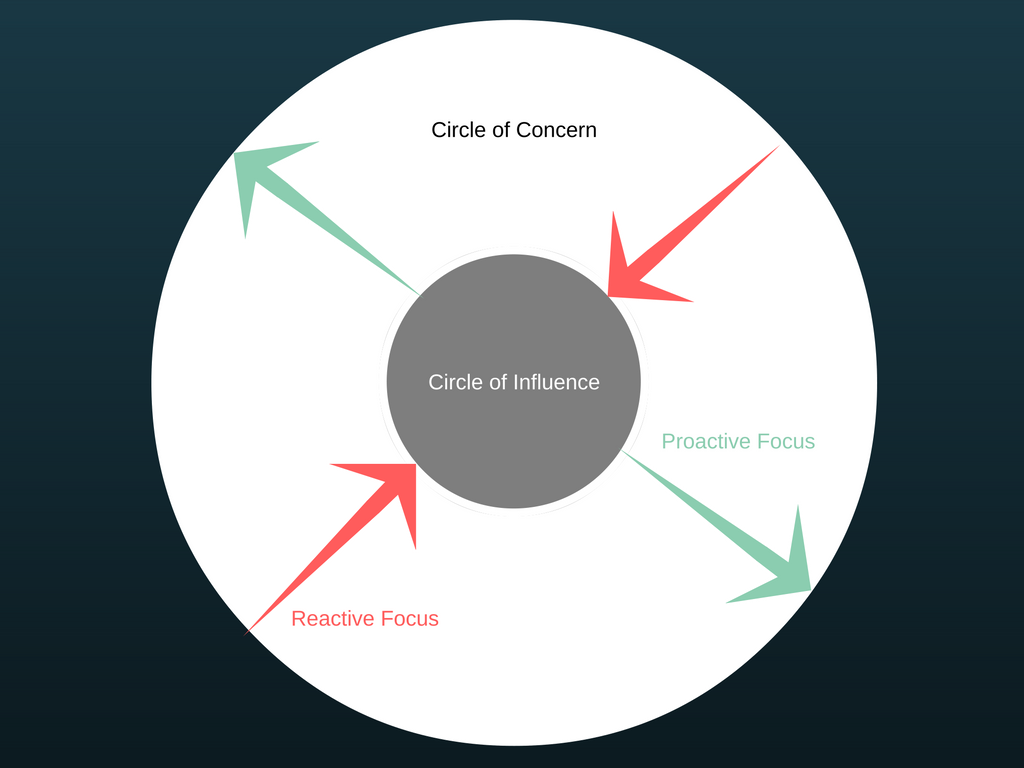“Basing our happiness on our ability to control everything is futile”
– Stephen R. Covey
I use the train system to get to work. Why? I see driving as a waste of time. On the train I can sleep, I can read, I can meditate. I have attempted all three while driving with no success. So, I spend a little bit of time standing on train platforms waiting for trains. Sometimes the train is late. It could be one minute, five minutes or it could be a lot longer. I am always interested in people’s reactions when this happens. I see people looking at their watches. I see pacing. I see fidgeting in their seats. I see angry words exchanged with the station staff. All of these behaviours are signs of frustration over something that these people have absolutely no control over.
(By the way, in the interest of full disclosure, I am guilty of this on occasion as well. This is especially true in periods of high stress or time pressure.)
These frustrations occur due to a lack of control and a lack of certainty. There is nothing that we can do to make the train move faster or arrive at the platform earlier. Even the station staff has no control over this. We have somewhere to be and now we are not certain that we will make it there on time. Yet, people seem to think that becoming agitated, frustrated or angry will somehow improve the situation.
We know, rationally, that this kind of reaction doesn’t help.
Now, as you are reading this, put yourself in that situation and say to yourself, “What is within my control?”
Stephen Covey in his book, 7 Habits of Highly Effective People, talks about Circles of Influence and Circles of Concern. His premise is that proactive people understand what they can do something about and what they cannot, and spend their time focused on the former. Whereas reactive people, to use Covey’s words:
“…. focus their efforts in the Circle of Concern. They focus on the weakness of other people, the problems in the environment, and circumstances over which they have no control. Their focus results in blaming and accusing attitudes, reactive language and feelings of victimisation.”
So, let’s now move from the train station to your work environment. Think about a situation at work right now over which you are feeling a measure of frustration. Go on. Take a minute…
Have you got something? Good. Now ask yourself ….
What is within your control?
I ask this question of my clients a lot. Often I notice that their language appears victim-like and they focus on the actions of others. Let me give you an example.
One of my clients – let’s call him John – was talking about how one of his peers was always coming to work late. “I’m always on time and complete my work and he’s always late. There are no repercussions for him. The CEO doesn’t seem to care that he’s never on time. The CEO should hold him to account and make him be here when he is supposed to be. It’s not fair for the rest of us.”
Firstly, I’d like you to notice the language that John is using here. “It’s not fair for the rest of us.” This language is self-victimising. John has given his peer the power to affect his emotions and enjoyment of work. So, after highlighting this to John I asked him “What is within your control?” Here is some of what we came up with:
- You can’t control other people. John realised he couldn’t make his colleague come into work on time. If he wanted to influence his peer he could try by having a courageous conversation with him (that’s a whole different article), but ultimately, there was no way to force him to be there early.
- Spending time worrying about things outside your control increases stress. Focusing on what you can control increases your sense of achievement. John came to understand that worrying about his colleague was causing him levels of frustration that were impacting on his own ability to complete and enjoy his work. When he refocused on his own work and what he could control he started to find satisfaction in his job again.
- You can control how you think about the situation. John came to the realisation that if he adopted a curious mindset to the situation, rather than a judgmental one, he felt better about the situation. (For more on using curiosity in the workplace check out one of our recent blogs here). With curiosity, John started asking questions like, “I wonder what is going on for him that’s causing him to be late?” This allowed John to take a different perspective on the situation. He was now able to feel a measure of concern for his peer rather than feeling a level of annoyance.
Asking yourself the question, “What is in my control?” is a powerful way to bring you back to what is important. It allows you to reduce your stress levels and re-engage with work. The benefits of this approach can also be applied to other areas of your life, not just work, where you may be focusing on things outside of your control. The Centre for Creative Leadership recently published a related article on reducing your stress by letting go of rumination and “controlling your attention”.
So, what I want you to do is …
This week, notice when you are feeling frustrated. Whether it is on the train platform, sitting in traffic, at work or at home, notice when you are starting to feel increased stress. This may be evidenced by a rise in heart rate, increased sweating, lack of concentration, a general feeling of being angry or annoyed, or even the use of colourful language. You will know your own warning signs.
When you notice these things, ask yourself, “What is in my control?” You may be surprised by how your feelings of frustration and annoyance reduce when you focus on what can do and let go of what you can’t.
Do you know someone in your network that has trouble understanding what is within his or her control? How does it manifest itself? Please feel free to share this article with them and talk to them about it. I would love to hear your thoughts in the comments section below.
Have you yourself ever experienced feelings of annoyance at something outside of your control? How did you deal with that? I’d love to hear about your experiences so that we can all learn together.
If you would like to talk about this or any leadership related topics, please feel free to leave your comments below or get in contact with me here at Campbell Leadership Solutions. I’d be happy to talk to you about how we might assist you and your team.

